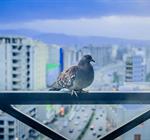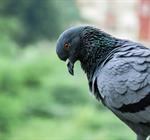
28 Sep 2020 | Apex Environmental Services (UK) Ltd
As much as it might be nice to see the odd pigeon or seagull flying around or frequenting the local churchyard, these creatures bring with them a whole host of health hazards. And it’s not just the birds themselves that cause all the problems. It’s their droppings too (guano).
What is Guano?
Basically put, guano refers to the droppings of bats or birds. Bird guano itself is actually a very good fertilizer as it is extremely high in nitrogen, potassium, and phosphate; all the essential ingredients needed for plant growth.
But while it may be an effective form of fertilizer, when it comes to humans being exposed to it, guano is bad news. Therefore any mess left behind by our feathered friends needs to be cleaned as soon as possible to prevent any health implications.
Health Risks and Other Issues
There are several health risks (and other problems) associated with the droppings left behind by birds. Here are some of the main ones:
Disease
The number one concern when it comes to bird guano is the amount of diseases that are associated with it. Some of the most common include:
- Candidiasis. This is a kind of fungus or yeast infection that’s spread by pigeons. It affects areas such as the skin, respiratory system, intestinal tract, and the vagina. While men can still catch it, women are much more susceptible. Left untreated it can cause pain, itching, and discharge.
- Histoplasmosis. This disease results from the fungus which grows in dried bird droppings. It attacks the respiratory system and can be fatal if not treated.
- Salmonellosis. More commonly referred to as food poisoning, salmonellosis can be traced back to bird guano. The dust from these droppings carries the disease and is easily sucked in through the likes of air conditioners and ventilators of homes and restaurants, contaminating food in the process. While it’s not usually fatal, typical symptoms of the disease include diarrhea, fever, and abdominal pain. These usually occur within 8 to 72 hours of being exposed to the pathogen and could last for several days.
- E.coli. This infection is one of the most common caused by enteric bacteria. Quite often this bacteria can be traced back to the fecal matter of pigeons, or some other related rodent. The problem with E.coli is that it’s so easily spread. It’s found in abundance in cow manure, and when birds eat this, they are then infected. But the E.coli goes straight birds, and ends up as a harmful contaminant in their droppings.
- Parasites, ticks, and mice. These are all other things in addition to disease and infection that pigeons may bring. This is often the case when the birds have developed a nest and have subsequently created a large number of droppings in the area. Big piles of bird droppings are the perfect environment for the breeding of all kinds of parasites and pests. And a dead pigeon will bring even more. The more established the pigeon infestation, the bigger the risk of things like ticks, mites, and lice appearing.
- Slippages. Bird guano can become very slippery if not cleaned up. And the last thing anyone wants is to fall in a load of pigeon poo. Not only do you have the risk of hurting yourself from the fall, but there’s the added risk of breathing in some awful toxin from the guano.
- Unsightly. While it may not be a hazard as such, seeing walls, windows, and buildings covered in bird guano is never a nice experience. If you’re in an area where you’re frequently having to clean up pigeon poop then you may want to consider more permanent measures such as bird netting or spikes.
The Clean Up Process
Once a pigeon infestation has been identified, if it’s in an area where people frequently visit, it needs to be dealt with straight away. While it is possible to clear up bird guano yourself, it’s not for the faint hearted.
But, if you are keen to try and sort it yourself, the following are a few things to consider before you get started:
- Prepare yourself. Before you begin the clean up process make sure you have all the relevant equipment you’re going to need ready. This includes adequate hand protection and protective clothing. Googles are also a good thing to have as they prevent you from potentially spreading disease when touching your face. Depending on where the mess is, you may also want to consider getting some plastic sheeting in which to lower the risk of contamination by limiting the chance of any bird guano particles becoming airborne.
- Get the right tools for the job. In addition to donning adequate protection for yourself, you need to ensure you use the correct equipment when attempting to clean away pigeon guano. Ideally you’ll want to have a guano removal bucket, as well as a variety of brushes and scrapers in which to remove the hardened feces. Shovels are also useful if having to clean up a particularly large amount.
- Arm yourself with adequate cleaning sprays and repellents. While there are plenty of cleaning products on the supermarket shelves, these aren’t going to be sufficient for the job at hand. For the effective removal of bird guano, you need to use a proper guano cleaning solution. These products have been specially designed to tackle this kind of problem, and will do a much better job than any general household cleaner.
Cleaning up pigeon guano is no fun task. It’s smelly, it’s dirty, and if the right safety equipment isn’t used, it can be dangerous. But, because of the inherent health risks associated with it, it is something which can not be left either.
If you’re not quite ready to tackle this problem yourself, then don’t worry as we can help. We have a team of experts on hand who have all the skills and knowledge needed to get the job done to a high standard.
Talk to Apex Bird Control Today
Protecting your buildings from birds requires a bespoke solution. The architecture of the building and your location will have an impact on which species of birds are most likely to pose a risk to your business. By talking to our team, we can help you to identify an effective bird control system.
To find out more today, contact Apex Bird Control now on 01256 578025 or email us at info@apexbirdcontrol.uk


